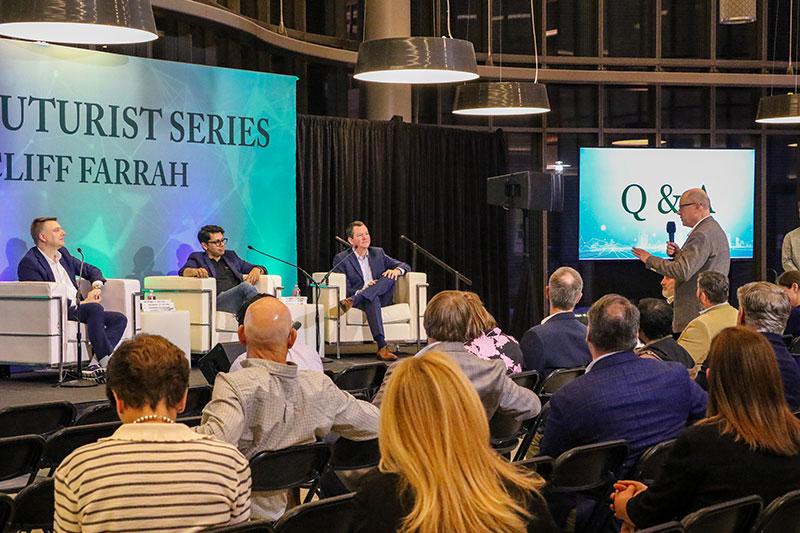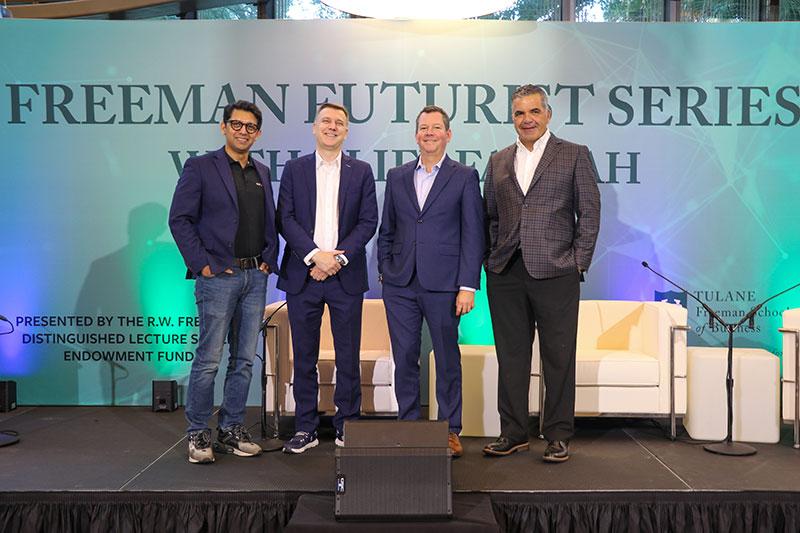Freeman Futurist Series looks at AI, Robotics and Quantum

AI stocks may be fueling the S&P 500’s historic rise, but a recent study by MIT found that 95% of companies are getting zero return on their AI investments. That’s something Ben Carey (TC ’00, MBA ’01) is keenly aware of.
“Companies are running headlong into this new technology because it is important and it is something they know can change their business, but too few of them are actually extracting value from it,” said Carey, senior managing director at Accenture and an expert on AI strategy. “Unless you’re actually changing the work, you’re not creating value. I think that’s where we see a lot of people struggling.”
Carey was one of three executives who discussed opportunities and challenges in today’s most transformative technologies for the Freeman Futurist Series, a new speaker series presented by the Stewart Center for Professional & Executive Education with support from the R. W. Freeman Distinguished Lecture Series Endowment Fund. The inaugural presentation in the series, which looked at AI, robotics and quantum computing, took place on Oct. 16 in the Freeman School’s Marshall Family Commons.
“The majority of companies are launching pilots and making people familiar with the technology, which is all good foundational stuff, but they haven’t reengineered the actual work,” said Carey, who leads growth and strategy for Accenture’s $30 billion Americas business. “That holistic look at the work is really what’s missing from AI initiatives.”
Joining Carey for the conversation were Giby Raphael, CEO of Revobots, a robotics company that produces 3D-printed humanoid robots, and Rob Hays, former CEO at Atom Computing, a pioneer in the field of quantum computing. Serving as moderator was Cliff Farrah, chief strategy officer for Global Corporate Strategy and Growth at Accenture and an Executive-in-Residence at the Freeman School.
Raphael said AI-powered imitation learning, which enables robots to learn complex tasks by observation, is setting the stage for a revolution in the workforce.
“By the end of this decade, there will be 85 million unfilled blue collar jobs,” Raphael said. “We often think robots are coming for our jobs, but it’s almost the exact opposite. There are jobs we call the four D tasks — dirty, dexterous, dangerous and dull. You don’t want humans to do these. So [robots are] coming, but it’s only to help fill that void of things humans don’t want to do.”
The biggest challenge to designing autonomous robots, Raphael said, is the lack of training data.
“You need to deploy to get the data, and you need to bring down the cost of the robot,” he said. “To democratize robotics, robots should not cost more than a laptop. That’s how you get two to three per household or many per factory.”

Hays, whose experience includes senior roles at Intel and Lenovo, highlighted some of the enormous problems that quantum computing can potentially solve.
“We can now start to simulate what very complex molecules in new drugs might look like as they attach to protein receptors in the body, so we can shrink the amount of time to drug design from what could be years or months to days or hours, potentially,” he said.
Ultimately, he said managers should ignore quantum only at their peril.
“You don’t have to be an expert in quantum physics, but if you do some research on the capabilities of the systems, you can start to create a road map for how quantum computing, or robotics or AI, can give you a competitive advantage,” he said. “And if you don’t do it, your competitor will, and you’ll be disadvantaged.”
Farrah, who organized the event, summed up the theme.
“These are the horizontals,” he said. “These three technologies will impact every industry over the next decade.”
To see the presentation in its entirety, visit the link below.
The next Freeman Futurist Series presentation, focusing on health care, will take place Jan. 22, 2026.
Interested in advancing your education and/or career? Learn more about Freeman’s MBA programs. Find the right program for you.
Other Related Articles
- Alumna leverages Freeman network to land dream job at Entergy
- Alumna recalls trailblazing career in business, ministry
- Deseret News: Californians are asking, is it time to raise taxes on the rich?
- Students network their way through Manhattan in annual Real Estate Trek
- Futurist series highlights consumerization of health care
- Executive MBAs team up with peers from around the world for International Week
- Snapping Back: Alumna is HP’s guardian against disruption
- NBC News: Elon Musk has left the White House, but he hasn't left politics behind on X
